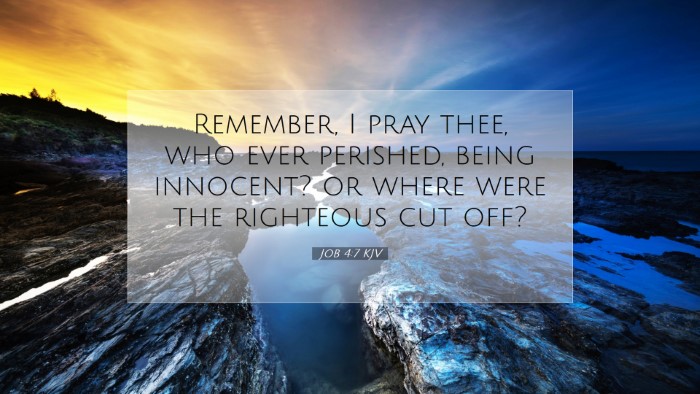Old Testament
Genesis Exodus Leviticus Numbers Deuteronomy Joshua Judges Ruth 1 Samuel 2 Samuel 1 Kings 2 Kings 1 Chronicles 2 Chronicles Ezra Nehemiah Esther Job Psalms Proverbs Ecclesiastes Song of Solomon Isaiah Jeremiah Lamentations Ezekiel Daniel Hosea Joel Amos Obadiah Jonah Micah Nahum Habakkuk Zephaniah Haggai Zechariah MalachiJob 4:7
Job 4:7 KJV
Remember, I pray thee, who ever perished, being innocent? or where were the righteous cut off?
Job 4:7 Bible Commentary
Commentary on Job 4:7
Verse Reference: Job 4:7 - "Remember, I pray thee, who ever perished, being innocent? or where were the righteous cut off?"
Introduction
This verse, spoken by Eliphaz the Temanite, serves as a pivotal moment in the Book of Job, inviting deep reflection on themes of suffering, justice, and divine providence. Eliphaz, in his initial attempt to comfort Job, presents a proposition based on his understanding of divine justice and the nature of human suffering. This commentary synthesizes insights from notable public domain commentaries to explore the layers of meaning in this profound question.
Understanding Eliphaz's Statement
Matthew Henry asserts that Eliphaz represents the typical mindset of his time, believing that suffering must be correlated with sin. The rhetorical question he presents highlights a common belief: the idea that the innocent do not suffer. Henry argues that while this belief may reflect a certain strand of truth, it is fundamentally flawed when applied universally, as evidenced by Job's own plight.
Albert Barnes comments on the use of the word "innocent," noting that Eliphaz assumes a definitive connection between innocence and the absence of suffering. Barnes elaborates by stating that Job's suffering challenges this simplistic view. The notion that righteousness guarantees immunity from suffering is a central theme that Barnes emphasizes, demonstrating how Eliphaz's perspective fails to encapsulate the complexities of divine justice.
Adam Clarke provides additional insight by discussing the implications of Eliphaz's assumptions about divine retribution. Clarke suggests that the question reflects Eliphaz's rigid theological system that equates suffering with divine punishment. This rigidity, according to Clarke, ignores the nuances of individual experiences, particularly Job's, highlighting a theological crisis that emerges in moments of intense suffering.
The Problem of Suffering
In examining this verse, we must explore the broader theological implications regarding the problem of suffering. Matthew Henry notes that not all suffering is a result of personal sin. He encourages readers to consider other factors, such as the mysteries of divine providence and the presence of evil in the world. He states, "Many righteous persons have suffered; and hence we see that innocent suffering is not an anomaly, but a part of the fallen human experience."
Albert Barnes expands on this by mentioning that the notion of suffering as a direct consequence of one’s moral state can lead to devastating theological errors. He suggests that such a perspective can be harmful, causing individuals to question their worthiness and standing before God in the face of hardship. Barnes emphasizes the necessity of a nuanced understanding of suffering that acknowledges both divine justice and the realities of human existence.
Adam Clarke reiterates this point, stating that God’s ways are often hidden from human understanding, leading to an incomplete interpretation of suffering. Clarke emphasizes the need for humility and trust in God's greater plan, noting that not all suffering is punitive; sometimes it exists for purposes known only to God.
The Role of Divine Justice
Eliphaz posits a foundational principle regarding divine justice: that the righteous will ultimately be delivered from suffering while the wicked will face punishment. Matthew Henry contends this reflects a certain truth but cautions that it is not absolute. He notes that God, in His sovereignty, may allow the righteous to endure trials to fulfill His greater purposes. This challenges the simplistic view that all suffering is retributive.
Albert Barnes suggests that the moral order of the universe, as laid out by Eliphaz, is often misinterpreted. He argues that God's justice operates on a level far beyond human understanding. The idea that the innocent never perish does not hold water in the face of evidence from lived experiences, including Job's own.
Adam Clarke reinforces this by affirming that Eliphaz's arguments lack the compassion and insight necessary to truly comfort Job. Clarke posits that the righteousness of an individual cannot be solely discerned based on their experiences of suffering or prosperity. True divine justice may not be readily evident from human perspectives; rather, it unfolds within the realm of God's providence.
Modern Application
This verse resonates profoundly in contemporary discussions surrounding suffering and righteousness. The challenges Job faces are not unlike those confronted by individuals today, leading many to ask similar questions about divine justice and personal suffering. Matthew Henry provides a timeless reminder that while the innocent may suffer, it does not equate to God's abandonment; instead, it may serve a divine purpose beyond human comprehension.
Albert Barnes and Adam Clarke both encourage a posture of humility in the face of suffering. Recognizing that our understanding is limited, we are called to maintain faith in God's justice and goodness, even when circumstances seem to contradict these beliefs.
For pastors, students, theologians, and Bible scholars, the exploration of Job 4:7 urges a deeper engagement with the implications of suffering in the life of faith. It calls for a theological reflection that honors the tension between divine justice and human experience, encouraging an empathetic pastoral approach to those enduring hardship.
Conclusion
Job 4:7 opens a profound dialogue on the nature of suffering, righteousness, and divine justice. Eliphaz’s assertion invites us to reassess our understanding of innocent suffering and the complexities of God's governance in our lives. Through insights from Matthew Henry, Albert Barnes, and Adam Clarke, we are reminded that suffering cannot be easily attributed to personal sin, and that God’s justice, while often inscrutable, is ultimately intertwined with His love and sovereignty.
As we reflect on this verse, may we be equipped to navigate the realities of suffering with wisdom, compassion, and faith, recognizing that our understanding is but a glimpse into the profound mystery of God's ways.


